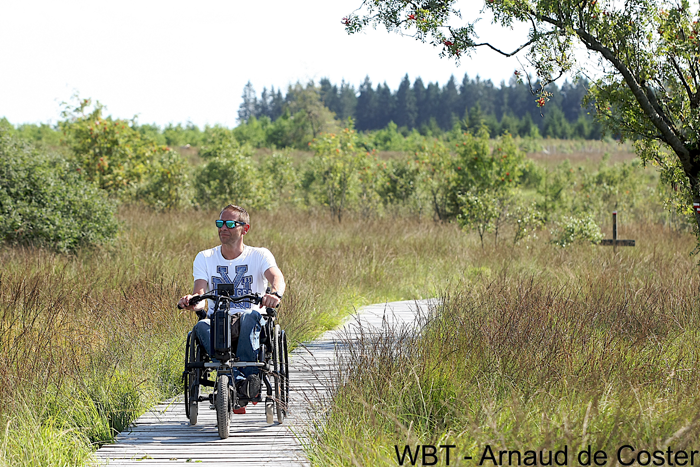Case Study
Nature trails accessible to all!
Contact name
Elodie Dispaux
Institution name
Fédération des Parcs naturels de Wallonie
Region & country
Wallonie, Belgium
Summary
Eleven Natural Parks in Wallonia have undertaken to develop a NAtura2000 trail accessible to a wide audience, especially people with specific needs. Thanks to the support of consultancies specializing in accessibility, they adapt accessibility and teaching aids according to the targeted needs (visually impaired, blind, hard of hearing, deaf, walking with difficulty, pmr, difficulty in understanding).

Natur'Accessible
WBT - Arnaud de Coster
Background of the project
Few of the nature trails are designed for people with specific needs; these people are often discouraged from going for a walk since nothing has been thought of to facilitate their access.
To be able to access nature, to unspoiled places where you can meet various species, where you can observe the landscapes and listen to the birds is a need expressed by many people. Nature is beneficial from many points of view, source of well-being and renewal, no one should be excluded.
Solution and actions taken
Development of 11 trails in Natura2000 areas and adapted educational panels and modules to learn more about the present environment. The paths are adapted to one or more types of needs (people in wheelchairs, walking with difficulty, blind and partially sighted, deaf and hard of hearing, presenting difficulties of comprehension…)
The teams of the natural parks concerned worked in collaboration with Access-i and its design offices, but also with the municipalities and local authorities to select a path, define the type of people for whom we were going to work, write the specifications for the various facilities (accessibility of the trail, educational modules, welcome signs, relaxation areas, etc.), monitor the work and ensure the promotion of the trail to the audiences concerned.
Other institutions or parties involved
– Each team from the natural parks concerned worked on setting up their own trail in partnership with the Federation, which initiated the project.
– Access-i for general project monitoring, certification and promotion via their channels.
– The Access-i design offices who provided personalized support for each Natural Park.
– Local partners: municipalities concerned for authorizations and works, tourist organizations for advice and promotion, etc.
Results
Part of the 11 trails have been completed. The facilities are fenced and the panels and didactic modules installed. We are continuing with an important phase of promotion / communication around the project (press communication, inaugurations, publication of leaflets, articles on the web and social networks, production of videos, etc.). A methodological brochure is also being drafted to list the stages in the creation of such a project, to provide relevant information and advice.
Challenges
Mainly technical problems in the field, some adjustments were really significant and required a long work of analysis and implementation.
Other problems linked to specific circumstances: wood inaccessible due to swine fever, vandalized places, etc.
Lessons learned
The first positive feedback from users shows the interest of this project, responding to a real need. The number of people with temporary or permanent disabilities is increasing, so it is essential that projects of this type emerge all over our country.
Contact name
Elodie Dispaux
Institution name
Fédération des Parcs naturels de Wallonie
Website(s)
